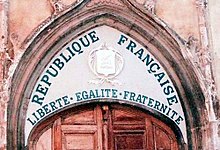
Back العلمانية في فرنسا Arabic Fransada dünyəvilik Azerbaijani লাইসিতে Bengali/Bangla Sekularisme i Frankrig Danish Laicismo en Francia Spanish لائیسیته Persian Ranskan sekularismi Finnish Laïcité en France French Sekularisme Prancis ID Laicità in Francia Italian
You can help expand this article with text translated from the corresponding article in French. (January 2017) Click [show] for important translation instructions.
|

| Part of a series on |
| Radicalism |
|---|
Laïcité ([la.i.si.te]; 'secularism')[1][2] is the constitutional principle of secularism in France. Article 1 of the French Constitution is commonly interpreted as the separation of civil society and religious society. It discourages religious involvement in government affairs, especially in the determination of state policies as well as the recognition of a state religion. It also forbids government involvement in religious affairs, and especially prohibits government influence in the determination of religion, such that it includes a right to the free exercise of religion.[3][4]
French secularism has a long history: Enlightenment thinkers emphasized reason and self direction. Revolutionaries in 1789 violently overthrew the Ancien Régime, which included the Catholic Church. Secularism was an important ideology during the Second Empire and Third Republic. For the last century, the French government policy has been based on the 1905 French law on the Separation of the Churches and the State,[5] which is however not applicable in Alsace and Moselle. While the term laïcité has been used from the end of the 19th century to denote the freedom of public institutions from the influence of the Catholic Church, the concept today covers other religious movements as well.[6]
- ^ "Dictionnaire GLOBAL Français-Anglais, 2018". Archived from the original on 4 May 2022. Retrieved 28 February 2020.
- ^ Collins Robert French Dictionary Unabridged, Harper Collins publishers
- ^ Religion and Society in Modern Europe, by René Rémond (Author), Antonia Nevill (Translator), Malden, MA, U.S.A.: Blackwell Publishers, 1999.
- ^ Evelyn M. Acomb, The French Laic Laws, 1879-1889: The First Anti-Clerical Campaign of the Third French Republic, New York: Columbia University Press, 1941
- ^ "France". Berkley Center for Religion, Peace, and World Affairs. Archived from the original on 17 July 2015. Retrieved 15 December 2011. See drop-down essay on "The Third Republic and the 1905 Law of Laïcité"
- ^ Excerpt of Nouveau dictionnaire de pédagogie et d'instruction primaire, 1911: "Jeunes Laïques - la Laïcité selon Ferdinand Buisson". Archived from the original on 7 September 2012. Retrieved 6 November 2008.
© MMXXIII Rich X Search. We shall prevail. All rights reserved. Rich X Search